Press Release
December 8, 2011

The Think Club Publications Announces Book of the Year Award for 2011
Bloomfield Hills, MI, December 8, 2011 The Think Club Publication has chosen 'Poorvabhas' (http://www.poorvabhas.in/) for its 2011 Book of the Year award. Think Club Publication, from now on, will give this award to struggling and lesser known writers in helping and encouraging them in their endeavor. Think Club Publication may also choose writers from languages other than English. This year we chose the Hindi language. The Think Club chose 'Poorvabhas' for the award because of its effort in promoting fledgling Hindi writers through its web publication. 'Poorvabhas' has very effectively provided such a platform to amateur writers in an effort to strengthen Hindi language. Think Club Publications realizes the value of this effort and thus presents the Book of the Year award for 2011 to 'Poorvabhas.' We especially congratulate Mr. Abnish Singh Chauhan for creating such an effective platform for Hindi writers and poets.
..........................................................................................................................................................................
Press Release
December 28, 2010
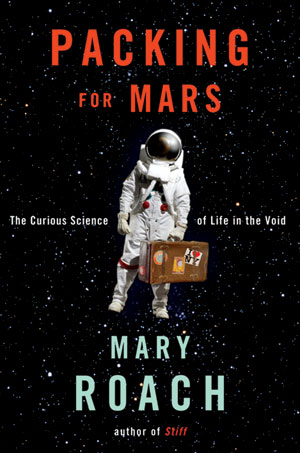
The Think Club Publications Announces Book of the Year Award for 2010
Bloomfield Hills, MI, December 28, 2010 The Think Club Publication has chosen Packing for Mars: The Curious Science of Life in the Void by Mary Roach, published by W.W. Norton & Co. as the Book of the Year for 2010. Think Club Publication is a forum to encourage independent thinking among fellow human beings. This annual award is given to the author whose idea or ideas can contribute to the resolution of contemporary human problems based on his or her original and independent thinking. The Think Club chose Packing for Mars as the Book of the Year because the author provides us the facts to think independently whether "Is Mars possible" and "Is Mars Worth it?" She also gives us enough ammunition to decide whether we should be spending $500 billion on human Mars mission or rely on cheap, reliable, robotic missions. Roach starts with the premises that the human body is inadequately designed for a long space travel. Roach emphasizes this by listing the details about disposing of human waste, controlling body odor without washing, radiation from cosmic rays, falling sick in space and bone loss. Besides the physical problems, Roach also elaborates on emotion and sex. After all human beings will be traveling for a year (includes time on Mars) through darkness of space cooped up with other mates who may be getting on each others' nerves. Mary Roach describes how it is possible to preview space without ever leaving Earth. From the space shuttle training toilet to a crash test of NASA's new space capsule (cadaver filling in for astronaut), Roach takes us on a surreally entertaining trip into the science of life in space and space on Earth. But most of all, Roach explains why a mission to Mars is important for human spirit without hiding the difficulties to get there. This is as important to human endeavor and progress today as the hot air balloon expedition by Mongolfier Brothers was in 1780. Thus we present the Book of the Year award for 2010 to Mary Roach for reminding us that how spending on space program will give birth to new innovations. Roach has aptly quoted Benjamin Franklin to answer the skeptics, "What use is a newborn baby?"
..........................................................................................................................................................................
Press Release
December 28, 2009
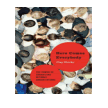
The Think Club Publications Announces Book of the Year Award for 2009
Bloomfield Hills, MI, December 28, 2009 The Think Club Publication has chosen Here Comes Everybody: the Power of Organizing without Organizations by Clay Shirky, published by Penguin for the Book of the Year Award for 2009. Think Club Publication is a forum to encourage independent thinking among fellow human beings. This annual award is given to the author whose idea or ideas can contribute to the resolution of contemporary human problems based on his or her original and independent thinking. The Think Club chose Here Comes Everybody for this award because the author explains how common people can and is making changes in society by exerting freedom of speech by using new technologies of social networking. The author illustrates how a common man can really impact the social norms and can make his or her voice heard without depending on traditional media such as newspapers, radio and television. Shirky illustrates how blogging has enabled the common man to publish his or her own viewpoints without depending on a traditional press outlet. The change isn't a shift from one kind of news institution to another, but rather in the definition of news. News is no longer an institutional prerogative. It's part of a communications ecosystem, occupied by a mix of formal and informal organizations and individuals. This extraordinary book examines the ways that new communications technologies enable groups of likeminded people to form more easily than ever before, regardless of geography. As the invention of the birth control pill and the transistor have led to fundamental changes in society, so too has the invention of social media and the Web 2.0. Online social networks have enabled productive, collaborative groups to have their voices heard more effectively than at any other time in history. Shirky makes sense of the way that groups are using the Internet. In a treatise that spans all manner of social activity from vigilantism to activism, from Flickr to Howard Dean, from blogs to newspapers, Shirky clearly explains how every institution is prone to being recast by the net, and how to manage that change for the best possible outcome. He picks perfect anecdotes to vividly illustrate his points, then shows the larger truth behind them. Shirky explains to the readers why the Internet communication like Twittering matters. Thus, we present the Book of the Year award for 2009 to Clay Shirky for reminding us about how the vitality and influence of groups of human beings can impact businesses, society and our lives by using net- enabled social tools.
..........................................................................................................................................................................
Press Release
December 28, 2008

The Think Club Publications Announces Book of the Year Award for 2008
Bloomfield Hills, MI, December 28, 2008 The Think Club Publications has chosen The Trillion Dollar Meltdown - Easy Money, High Rollers and the Great Credit Crash by Charles R. Morris, published by Public Affairs, New York for the Book of the Year Award for 2008. Think Club Publication is a forum to encourage independent thinking among fellow human beings. This annual award is given to the author whose idea or ideas can contribute to the resolution of contemporary human problems based on his or her original and independent thinking. The Think Club chose The Trillion Dollar Meltdown for this award because the author explains why our economy is melting down in a layman's term for those who are not in the financial services industry. Moreover, the author's predictions were made before we were hit by the present financial storm. Mr. Morris used his independent thinking to predict that it was time once again for the pendulum to swing in the direction of more socially conscious government intervention. Charles Morris believes the era of market fundamentalism has come to an end, just as Keynesian interventionism came to an end in the 1970s. He estimates conservatively that the recent defaults of residential mortgages, corporate debt, credit card debt, and bonds will be about $1 trillion. But this book was written before even more recent revelations such as the Bear Sterns insolvency. It is now estimated that the bill could be 3 or 4 times as high. Morris gives a brief but excellent history of events that led up to the current credit crunch that is paralyzing global financial markets. Disasters have many fathers, but Morris lays much of the blame on bond rating agencies, financial insurance companies and the Federal Reserve under Alan Greenspan. After 9/11 the Federal Reserve lowered the interest rates below the rate of inflation, essentially giving banks free money. Banks then lent money for fees up front and then repackaged the loans - turned them into securitized debt - and sold them to investors. It was basically cost free and risk free, so they lent money as if there was no tomorrow. These securitized debts or CDOs (collateral debt obligations) were sold and resold throughout the global financial system and no longer did anyone know how to measure their value or their risk. Add to this the fact that homeowners were using the rising equity of their homes as ATMs and pumping another $4 trillion into the economy. Also add to the mix $700 billion annual trade deficit that indicates that much more consumption over production. The party was really in full swing. Morris is not a liberal ideologue but a former banker who comes to his conclusions based on objectivity, knowledge, and lucid thought. The integrity of his independent thinking shines through every page. Thus, we present the Book of the Year award for 2008 to Charles R. Morris for bringing the message to regular folks in an honest and understandable way instead of hiding behind a curtain of mathematical complexity.
..........................................................................................................................................................................
Press Release
December 28, 2007
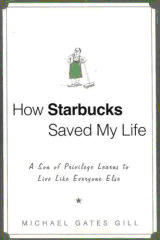
The Think Club Publications Announces Book of the Year Award for 2007
Bloomfield Hills, MI, December 28, 2007 The Think Club Publications has chosen How Starbucks Saved My Life – A Son of Privilege Learns to Live Like Everyone Else by Michael Gates Gill, published by Gotham Books for the Book of the Year Award for 2007. The Think Club Publications is a forum to encourage independent thinking among fellow human beings. This annual award is given to the author whose idea or ideas can contribute to the resolution of contemporary human problems based on his or her original and independent thinking.
The Think Club chose How Starbucks Saved My Life for this award because the author, an Ivy League graduate discovers that no profession is menial and professes respect towards people of all ages and races. Gill preaches what he really practiced, the lessons of life he learned in his sixties from a young black woman in her twenties. Gill actually stepped down from his Yale and top-ad-exec background, to don a Starbucks apron, serving coffee and cleaning sinks and toilets.
This is a real-life story of the author himself about how he found Starbucks, or rather it found him. One desolate day, Gill filled out an application and was hired to work in a Manhattan store. He shamefacedly donned a green barista’s apron and entered a world in which he was a minority: His colleagues were African-American and decades younger, and he was the least skilled person in the room. Gill becomes adept at his new job; along the way, he muses on his breathtakingly biased former self: Race, social class, age—you name it, he condescended about it from his former “position at the top of American society” as a “member of the Ruling Class.”
By memoir’s end, the reader will have learned much about life as a barista, from company policy to coffee tasting. Gill compares his plight to that of baby boomers nationwide, and reflects on his new perspective. This barista’s story ends on an up-note, though; he transfers to a Starbucks near his apartment in a suburb, and has a movie in development with Tom Hanks as the lead. It does seem as if his Starbucks job gave Gill new hope; it will be interesting to see if he remains a barista, and whether he retains the lessons he learned as a Starbucks employee.
In short the story follows the life changing experiences that takes the author from being a Creative Director at J Walter Thompson to unemployment and despair. The book follows the twists and turns that lead Mr. Gill to become a barista in a New York Starbucks rediscovering self-respect and happiness in his new life. Thus, we present the Book of the Year award for 2007 to Michael Gates Gill for bringing the message that no work is menial and no one should be discriminated against on the basis of age and race.
..........................................................................................................................................................................
Press Release
December 28, 2006
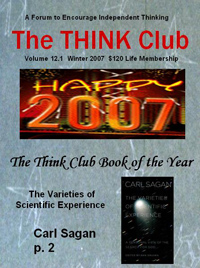
The Think Club Publications Announces Book of the Year Award for 2006
Rochester Hills, MI, December 28, 2006 The Think Club Publications has chosen The Varieties of Scientific Experience: A Personal View of the Search for God by Carl Sagan, edited by Ann Druyan and published by Penguin Press for the Book of the Year Award for 2006. The Think Club Publications is a forum to encourage independent thinking among fellow human beings. This annual award is given to the author whose idea or ideas can contribute to the resolution of contemporary human problems based on his or her original and independent thinking.
The Think Club chose The Varieties of Scientific Experience for this award because of the author’s efforts in bringing a balance between science and religion in today’s cynical environment. As a scientist, Sagan's most important contribution wasn't any specific theories or discoveries, but rather his ability to popularize science and make it accessible to the layperson. Once again, in this book, he succeeds in doing this. In the faith-and-reason conflict, Sagan was very much on the side of reason, although he allowed room for faith.
This is, essentially, a book on the existence of God, encompassing a collection of lectures Carl Sagan gave quite sometime ago and then edited by his wife, Ann Druyan. It combines the reason and logic of some of the best arguments against strict religious dogmas with the wit of Carl Sagan.
Sagan approaches religion from his background as a scientist. He takes complex scientific ideas and explains them learnedly and eloquently. He covers matters such as the origin of the universe and of the planets, the age of the universe, geological time, the origin of life, the likelihood of finding life on other planets in other galaxies, UFO's, and much else. Therefore, we present the Book of the Year award for 2006 to Ann Druyan and her late husband Carl Sagan for their courage in bringing equilibrium between science and religion, especially in today’s religious climate.
..........................................................................................................................................................................
2005 Book of the Year
Writing Home
Cindy La Ferle's poignant collection of essays reveals the extraordinary in the ordinary
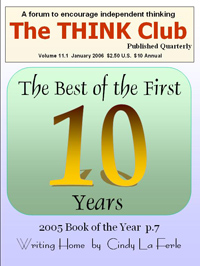
Bloomfield Hills, MI—The Think Club, a forum to encourage independent thinking among fellow human beings, chooses Writing Home, written by Cindy La Ferle for the Book of the Year award (first published by Hearth Stone Books, in 2005). This annual award is given to the author whose idea or ideas can contribute to the resolution of contemporary human problems based on his or her original and independent thinking.
The Think Club chose Cindy La Ferle for its 2005 award because of her belief in common sense and self-knowledge. Her memoirs and stories in the collection, Writing Home emphasizes the fact that each of us is a unit of the society we live in and of the world at large. She states this fact at the outset in the preface of the book, “Baking bread in my kitchen while U.S. military forces bombed Baghdad, I renewed my commitment to being a peacemaker in my own community.” Her views are her own and they never seem to be dictated by outside influences. Her realizations come from her own convictions. She ponders her son’s thorny struggle for independence, and what it means to be a wife, mother, and homemaker in a culture that often marginalizes traditional feminine roles. She seeks answers to those questions from within – without anyone doing the thinking for her.
Her revelations can be the key to happiness in today’s rat race where we look up to so called role-models for answers. She rebukes us by telling, “Even today, few men or women will admit they enjoy doing anything remotely domestic, unless it makes them as rich and famous as Martha Stewart.” She challenges us to be proud for what we are. While growing up, she never considered Barbie (38-18-34) as a threat to her self-esteem. At the same time she admired Barbie for being exactly what she was – a gal with options who never took herself too seriously.
Our society seems to make a big deal of teenagers’ tantrums. Cindy also takes that in stride. She reassures us that our teenagers don’t come from different planets. She understands that the teenagers feel trapped between the growing need for independence and the secret wish to cling to childhood – an agonizing conflict. That’s why the teenagers will hug their parents in the kitchen when nobody is looking. Her answer to this dilemma is the much needed virtue called patience. Writing Home reads like a panacea to all our social problems. We all seem to be stressed about entertaining people at our home. Cindy comes to the rescue again with her self-knowledge and common sense, “The quickest way back to sanity is to remind ourselves that most people are easily pleased with home cooking and real conversation.”
One of the special qualities of this book is that she has written every piece to find out what she thinks and to know where she stands. Writing Home is full of lessons on how to lead our lives. It teaches us to realize that everyone doesn’t need to like us in order for us to be acceptable. The truth is, people who care about us really do want to help – if only we’d drop the mask of total self-sufficiency and admit that we’re not all-powerful all the time. Rejection and its evil twin, criticism, are part and parcel of the working life. We should not care much for either of them.
Ultimately, Cindy likes to believe that our little lives have meaning. She sums it up very poignantly and meaningfully, “But the longer I live, the only thing I know for certain is this: Everything I hold sacred is hidden right here in plain sight.” Cindy presents us the challenge to be our best as people and wants us to “enjoy the happiness of the world we live and love.” Therefore, we present the Book of the Year award for 2005 to Cindy La Ferle (Writing Home) for her efforts in simplifying life for all of us based on her independent thinking.
..........................................................................................................................................................................
Press Release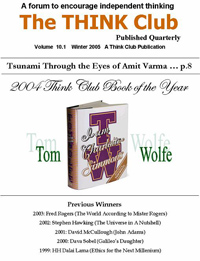
The Think Club chooses
I Am Charlotte Simmons
By Tom Wolfe
As the book of the year for 2004
December 15, 2004
Bloomfield Hills, MI — The Think Club, a forum to encourage independent thinking among fellow human beings, chooses I Am Charlotte Simmons, a penetrating and entertaining novel written by America’s brilliant story teller, Tom Wolfe (first published by Farrar, Straus and Giroux in 2004) for the Book of the Year award. This annual award is given to the author whose idea or ideas can contribute to the resolution of contemporary human problems based on his or her original and independent thinking.
The Think Club chose Tom Wolfe’s novel for its 2004 award because of his underlying message to parents – to know and understand what goes on in the lives of their innocent children in big schools and question those practices. The undergraduate schools are the breeding grounds for life’s immoralities where the kids are provided a country club atmosphere to indulge in promiscuous sex, drugs, alcohol, vulgarities and parental disrespect in the name of individuality and liberalism.
Wolfe creates a world of characters that are brought vividly to life, with conflicts and problems that are so painfully true. Dupont University, with its Olympian halls houses the cream of America’s youth. There comes brilliant Charlotte Simmons, a sheltered freshman from North Carolina. Charlotte soon learns, to her mounting dismay, that the pleasure of the body takes absolute precedence over the life of the mind. At Dupont, students sleep around with indiscriminate zeal. Boys and girls are forced to share the same bathrooms in the name of gender equality. The university administration is utterly indifferent to anything except the dogmas of political correctness.
We then race through plots involving students’ candy-colored interactions with each other and inside their own heads. Charlotte is a prodigy from a conservative Southern family; Jojo is a white basketball player struggling with race, academic guilt and job security; Adam, a student reporter cowed by alpha males. Through these characters, Wolfe has woven a virtual recitation of facts, albeit colorful ones – athletes getting a free pass boasting casual sex and machismo-fueled violence. The novel seems intent on shocking, but little here will surprise even those well past their term-paper years. Wolfe’s descriptions are shockingly brilliant such as, a basketball game seen from inside a player’s head.
With his eye for detail, Tom Wolfe draws on extensive observation of campuses across the country to immortalize college life in the 2000s. Wolfe spent years researching the lives and customs of similar characters at major U.S. universities before creating his own fictional characters. I Am Charlotte Simmons is a triumph of America’s master chronicler who has authored such narratives as The Electric Kool-Aid Acid Test, The Right Stuff, The Bonfire of the Vanities, and A Man in Full.
Wolfe has brought the culture of today’s university scene to us as a waking call. It’s amazing to notice how close to the truth Wolfe gets. The conflicts and problems dealt in the book are so painfully universal that the book will surely scare an awful lot of parents who have, so far, chosen to remain dormant. And so it is with great pleasure that we present the Book of the Year award for 2004 to Tom Wolfe for creatively urging us to make the administrators of the big educational institutions to concentrate on education and set codes of conduct according to the wishes of the parents who pay about $120,000 for tuition alone.
..........................................................................................................................................................................
Think book of the Year
Press Release

The Think Club chooses
The World According to Mr. Rogers
By Fred Rogers
As the book of the year for 2003
December 15, 2003
Bloomfield Hills, MI — The Think Club, a forum to encourage independent thinking among fellow human beings, chooses The World According to Dr. Rogers, a collection of thoughts and ideas written and spoken by the late Fred Rogers (first published by Hyperian in 2003) for the Book of the Year award. This annual award is given to the author whose idea or ideas can contribute to the resolution of contemporary human problems based on his or her original and independent thinking.
The Think Club choses Fred Rogers’ book for its 2003 award because of his emphasis on sharing what came naturally to him – his belief in basic human nature and his reassurance about its goodness to all of us based on his own original thinking and especially his observation about the scary realities of life, particularly since September 11th. He writes, “When I was a boy and I would see scary things in the news, my mother would say to me. ‘Look for the helpers. You will always find people who are helping.’ To this day especially in times of ‘disaster’, I remember my mother’s words and I am always comforted by realizing that there are still so many helpers-so many caring people in this world.”
In this age of mistrust and terrorism, his message is very timely and comforting. His emphasis on honesty, cooperation, compassion and that people will like you the way you are is remarkable and exceptional.
In a world that, at times, seems to be full of gray areas, Fred Rogers writes, “It’s not the honors and the prizes and the fancy outside of life that ultimately nourish our souls. It’s the knowing that we can be trusted, that we never have to fear the truth, that the bedrock of our very being is firm.”
This small volume collects many of his writings – from the songs he wrote for the show to his acceptance speech at the Television Hall of Fame – organized around themes like “The Courage to Be Yourself” and “We Are All Neighbors.” The format is occasionally tantalizing and brilliant. His most touching comment came when he said, “I’m proud of you not for the times you came in second, or third, or fourth, but what you did was the best you had ever done.”
Ultimately, one of the beauties of this book is the marvelous human spirit behind it. Rogers taught valuable lessons about keeping one’s promises, finding strength through helping others and not being afraid to cry. Fred Rogers challenge us to be our best as people and as thinkers. And so it is with great pleasure that we present the Book of the Year award for 2003 to the late Fred Rogers for teaching us to think independently at a time when we all seem to be unsure about human nature
..........................................................................................................................................................................
Press Release
The Think Club chooses
The Universe in A Nutshell
By Stephen Hawking
As the book of the year for 2002
December 15, 2002
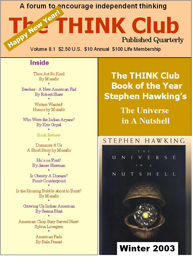 Bloomfield Hills, MI—The Think Club, a forum to encourage independent thinking among fellow human beings, chose The Universe in A Nutshell, authored by Stephen Hawking for the Book of the Year award (first published by Bantam Books, in 2001). This annual award is given to the author whose idea or ideas can contribute to the resolution of contemporary human problems based on his or her original and independent thinking. Bloomfield Hills, MI—The Think Club, a forum to encourage independent thinking among fellow human beings, chose The Universe in A Nutshell, authored by Stephen Hawking for the Book of the Year award (first published by Bantam Books, in 2001). This annual award is given to the author whose idea or ideas can contribute to the resolution of contemporary human problems based on his or her original and independent thinking.
The Think Club chose Stephen Hawking for its 2002 award because of his emphasis on how knowledge expansion can carry us forward faster to solutions than our geometric physical expansion. The future may well include major changes in the physical qualities of what a human is, a better connection between our brains and our electronic extensions, and the need to solve a delicate problem of where we should design for speed . . . and where for handling more complexity.
Professor Hawking has combined many perspectives to show how Einstein’s special and general theories of relativity have been updated to explain the big bang, black holes, and an expanding universe; superstring theory; p-branes; how many dimensions the universe has; whether the future can be predicted in a deterministic way; whether time travel is possible; how science will transform our biological and thinking futures in the context of Star Trek technology; and M-theory to consider whether “we live on a brane or are we just holograms?”
Those who wonder what science has to say about religious ideas will find this book valuable, for Professor Hawking is unafraid to address questions about whether there can be a beginning to the universe in a scientific sense. What could or could not have preceded the big bang?
One of the lessons of this book is that much of what we think of as “fact” is merely a convenient approximation of a more complex circumstance. Newton’s thinking about gravity is a good example. Where in your life do you need to know with as much precision as possible, and where will approximations work just fine? Making that choice well can be the most important talent one can develop.
Ultimately, one of the beauties of this book is the marvelous human spirit behind it. Professor Hawking presents us the challenge to be our best as people and as thinkers, therefore, we present the Book of the Year award for 2002 to Stephen Hawking for maintaining his independent thinking while, at the same time, trying to understand for himself and explain to his readers the complexities of science.
..........................................................................................................................................................................
Press Release
The Think Club chooses
John Adams
by David McCullough
as the book of the year for 2001
December 15, 2001
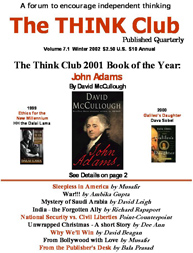 Bloomfield Hills, MI—The Think Club, a forum to encourage independent thinking among fellow human beings, chose John Adams, authored by David McCullough for the Book of the Year award (first published by Simon & Schuster, in 2001). This annual award is given to the author whose idea or ideas can contribute to the resolution of contemporary human problems based on his or her original and independent thinking. Bloomfield Hills, MI—The Think Club, a forum to encourage independent thinking among fellow human beings, chose John Adams, authored by David McCullough for the Book of the Year award (first published by Simon & Schuster, in 2001). This annual award is given to the author whose idea or ideas can contribute to the resolution of contemporary human problems based on his or her original and independent thinking.
Portrait of John AdamsThe Think Club chose David McCullough for its 2001 award because the ideas expressed by him in John Adams provide a practical solution to conflicts going on around us. In a time when our perception of the world is changing and many are re-evaluating our nation’s role in the world, visiting the birth of our country and the ideals under which it was formed can be a cathartic experience.
Mc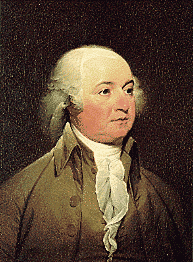 Cullough’s treatment of the life and times of John Adams provides a unique view into what is truly a unique and amazing time period, one which literally changed the world, and is still a major force in shaping today’s world events. By focusing on John Adams, the often forgotten and least understood figure in revolutionary America, McCullough is able to present the genesis of the “American Experiment” from the eyes of a man with a true passion for liberty, who maintained his integrity and principles through what was probably the most turbulent and unstable political period the world had yet seen. Cullough’s treatment of the life and times of John Adams provides a unique view into what is truly a unique and amazing time period, one which literally changed the world, and is still a major force in shaping today’s world events. By focusing on John Adams, the often forgotten and least understood figure in revolutionary America, McCullough is able to present the genesis of the “American Experiment” from the eyes of a man with a true passion for liberty, who maintained his integrity and principles through what was probably the most turbulent and unstable political period the world had yet seen.
Adams, who describes himself as an average man caught up in extraordinary events, was perceptive enough to understand that he was living through great events and had enough foresight to preserve most of his writings. Along with writings from his wife Abigail, his friend and political rival Thomas Jefferson, and excerpts from a multitude of other sources from the time period, we are able to gain a better perspective on the origins of our nation.
Most of all, McCullough has proven the strength of independent thinking through the characterization of John Adams. Adams believed strongly in opposition to slavery. He also believed in the rule of law. David McCullough’s John Adams has the sweep and vitality of a great novel. It is both a riveting portrait of an abundantly human man and a vivid evocation of his time, much of it drawn from an outstanding collection of Adams family letters and diaries. In particular, the more than one thousand surviving letters between John and Abigail Adams, nearly half of which have never been published, provide extraordinary access to their private lives and make it possible to know John Adams as no other major American of this founding era.
The man who was so ordinary when compared to the revolution’s extraordinary figures showed a profound commitment to the country he served in so many pivotal ways. As both ambassador and president, Adams accepted responsibilities for which he’d had little experience, recognizing that few people in this young country were any better prepared for the challenges inherent in this experiment in democracy. Through the conviction and strength of his independent thinking, Adams certainly rose to the challenges of his turbulent times. As a fledgling lawyer from a humble Massachusetts farm family, he seemed to follow an unerring moral compass, from his defense of British soldiers in the Boston Massacre on legal grounds, to his aggressive arguments for independence, well ahead of the curve of public sentiment. One of the most vocal advocates of the Declaration of Independence, he was the overseas ambassador charged with rallying foreign support to the fledgling nation.
We can certainly learn from the courage, conviction and experiments of John Adams. John Adams points us in the right direction. Therefore, we present the Book of the Year award for 2001 to David McCullough for depicting the life of John Adams, an independent thinker.
..........................................................................................................................................................................
 Press Release Press Release
P.O. Box 451, Bloomfield Hills, MI 48303-0451
Galileo’s Daughter by Dava Sobel Is Chosen as the Book of the Year by The Think Club
Bloomfield Hills, Michigan, December 15, 2000:
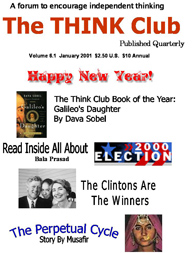 The Think Club, a forum to encourage independent thinking among fellow human beings, chose author Dava Sobel’s book, Galileo’s Daughter, published by Walker & Company, New York, as the book of the year for 1999-2000. This is the second year of the award. Last year the honor went to H.H. the Dalai Lama for his book, Ethics for the New Millennium. The Think Club, a forum to encourage independent thinking among fellow human beings, chose author Dava Sobel’s book, Galileo’s Daughter, published by Walker & Company, New York, as the book of the year for 1999-2000. This is the second year of the award. Last year the honor went to H.H. the Dalai Lama for his book, Ethics for the New Millennium.
This annual award is given to the author whose work or ideas inspire independent thinking among fellow human beings. Although Sobel may not have intended to promote the theme of independent thinking, being a master storyteller, she has brought to life the struggle of Galileo in expressing his thinking, which was contrary to the public and institutional opinions of the time. Sobel sums it up in describ ing Galileo’s most famous moments: ing Galileo’s most famous moments:
There was only one trial of Galileo, and yet it seems there were a thousand--the suppression of science by religion, the defense of individualism against authority, the clash between revolutionary and establishment, the challenge of radical new discoveries to ancient beliefs, the struggle against intolerance for freedom of thought and freedom of speech. No other process in the annals of canon or common law has ricocheted through history with more meanings, more consequences, more conjecture, more regrets (p. 232).
It is difficult today--from a vantage point of insignificance on this small planet of an ordinary star set along a spiral arm of one galaxy among billions in an infinite cosmos--to see the Earth as the center of the universe. Yet that is where Galileo found it (p. 49).
Galileo, either through nurture, nature, or a combination of the two, developed a personal philosophy much like his father’s. His father wrote in Dialogue of Ancient and Modern Music the following:
It appears to me that they who in proof of any assertion rely simply on the weight of authority, without adducing any argument in support of it, act very absurdly. I, on the contrary, wish to be allowed freely to question and freely to answer you without any sort of adulation, as well becomes those who are in search of truth (p. 17).
Galileo spent a great deal of his life at odds with the teachings Aristotle who was by the 16th and 17th centuries incorporated not only into the philosophies and thoughts of the educated but also part and parcel to many doctrines and dogmas of the Catholic Church. Saint Thomas Aquinas was largely responsible for melding Aristotle with Christian doctrine even though Aristotle lived hundreds of years before Jesus. Galileo wanted to prove things via superior methodologies. He relied on experiment whenever possible.
Sobel has done a remarkable job through the beauty of her writing and by paying close attention to fine details resulting in a work that not only feels real but also glorifies the courage and ingenuity of a great independent thinker. The Think Club feels honored in presenting its book of the year award for 1999-2000 to Dava Sobel for her work, Galileo’s Daughter.
..........................................................................................................................................................................
Press Release
December 1, 1999
The Think Club chooses “Ethics for the New Millenniun” by HH Dalai Lama as the book of the year for 1999
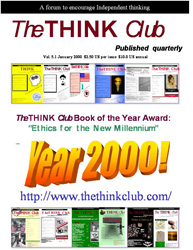 BloomfieldHills, MI—The Think Club, a forum to encourage independentthinking among fellow human beings, chose Ethics for the New Millennium, authored by His Holiness the Dalai for the Book of the Year award (first published by Riverhead Books, New York in 1999).This annual award is given to the author whose idea or ideas can solve any aspect of contemporary human problems based on his or her original and independent thinking. BloomfieldHills, MI—The Think Club, a forum to encourage independentthinking among fellow human beings, chose Ethics for the New Millennium, authored by His Holiness the Dalai for the Book of the Year award (first published by Riverhead Books, New York in 1999).This annual award is given to the author whose idea or ideas can solve any aspect of contemporary human problems based on his or her original and independent thinking.
The Think Club chose HH the Dalai Lama for its 1999 award because the ideas expressed by him in Ethics for the New Millennium provide a practical solution to religious conflicts going on around us. His Holiness’ solutions are based on his own observations and experiences and not dictated by any fanatic ideology.
It is unusual for the head of a religion to speak his mind so candidly against religious dogma without the fear of punishment and criticism by the establishment. It takes courage for an exiled monk to declare that following positive ethical conduct is better than following an organized religion. The book is full of humble but dauntless passages like the following:
“Not that 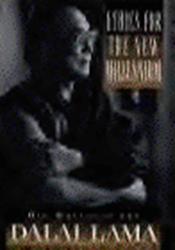 reader should suppose that, as Dalai Lama, I have any special solution to offer… There are other faiths, and other cultures, no less capable than mine of enabling individuals to lead constructive and satisfying lives… What is more, I have come to the conclusion that whether or not a person is a religious believer does not matter much. Far more important is that they be a good human being… These may seem unusual statements, coming as they do from a religious figure…I am, however, Tibetan before I am Dalai Lama, and I am human before I am Tibetan.” reader should suppose that, as Dalai Lama, I have any special solution to offer… There are other faiths, and other cultures, no less capable than mine of enabling individuals to lead constructive and satisfying lives… What is more, I have come to the conclusion that whether or not a person is a religious believer does not matter much. Far more important is that they be a good human being… These may seem unusual statements, coming as they do from a religious figure…I am, however, Tibetan before I am Dalai Lama, and I am human before I am Tibetan.”
According to HH the Dalai Lama, all religions have contributed in the development of spiritual practices and all religious faiths demand them. According to the book, spiritual practice entails an ethical practice. Moreover, one shouldn’t forget that our happiness is bound up with the happiness of others.
The messages expressed in Ethics for the New Millennium come as a timely solution to the strife-ridden world where the seeds of intolerance and hatred can be found in some of the teachings of many faiths, for example those which assert the exclusiveness of the faith, or superiority of the faithful over the infidel, the heathens or simply those who are different.
We can certainly draw common ethics from the teachings of all faiths: a single set of ethics that all faiths could accept as their own. Ethics for the New Millennium points us in that direction. Therefore, we present the Book of the Year award for 1999 to His Holiness the Dalai Lama for his book Ethics for the New Millennium with due respect and humility.
Previous Winners
2005: Writing Home by Cindy La Ferle
2004: I Am Charolette Simmons by Tom Wolfe
2003: The World According To Mr. Rogers by Fred Rogers
2002: The Universe In A Nutshell by Stephen Hawkings
2001: John Adams by David McCullough
2000: Galileo's Daughter by Dava Sobel
1999: Ethics for the Next Millenium by HH Dalai Lama
web add: http://www.thethinkclub.com/year-book.html
|
 Dr. Bala Prasad is a founder member, partner and publisher of TheThinkClub. Dr. Prasad is a retired orthopedic surgeon. He is an avid reader and believes in free exchange of thoughts. He is involved in various social organization where he donates his time and money for the needy.
Dr. Bala Prasad is a founder member, partner and publisher of TheThinkClub. Dr. Prasad is a retired orthopedic surgeon. He is an avid reader and believes in free exchange of thoughts. He is involved in various social organization where he donates his time and money for the needy.![]()
 Anil Shrivastava (pen name Musafir) is a founder member, partner and managing editor of TheThinkClub. Anil is a great proponent of independent thinking among fellow human beings which also means being nonpartisan and unbiased. Anil is a retired engineer with great accomplishments but writing is his first love.
Anil Shrivastava (pen name Musafir) is a founder member, partner and managing editor of TheThinkClub. Anil is a great proponent of independent thinking among fellow human beings which also means being nonpartisan and unbiased. Anil is a retired engineer with great accomplishments but writing is his first love.![]()
 Dr. Niru Prasad is an editor-at-large at TheThinkClub. She writes a regular column titled, Lifestyle. She is a physician for over 30 years. Dr. Prasad is a fellow member of the American College of Emergency Physician and the American Academy of Pediatrics. Dr. Prasad has written numerous articles on many different health issues for local newsletters and newspaper. She has written articles about Adult Emergency and Pediatric Medicine.
Dr. Niru Prasad is an editor-at-large at TheThinkClub. She writes a regular column titled, Lifestyle. She is a physician for over 30 years. Dr. Prasad is a fellow member of the American College of Emergency Physician and the American Academy of Pediatrics. Dr. Prasad has written numerous articles on many different health issues for local newsletters and newspaper. She has written articles about Adult Emergency and Pediatric Medicine.![]()
 David Beagan is a consulting editor of TheThinkClub. David works in the Information Technology field. He has been associated with TheThinkClub from its inception in 2015. David also writes regular columns for TheThinkClub.
David Beagan is a consulting editor of TheThinkClub. David works in the Information Technology field. He has been associated with TheThinkClub from its inception in 2015. David also writes regular columns for TheThinkClub.









 Bloomfield Hills, MI—The Think Club, a forum to encourage independent thinking among fellow human beings, chose The Universe in A Nutshell, authored by Stephen Hawking for the Book of the Year award (first published by Bantam Books, in 2001). This annual award is given to the author whose idea or ideas can contribute to the resolution of contemporary human problems based on his or her original and independent thinking.
Bloomfield Hills, MI—The Think Club, a forum to encourage independent thinking among fellow human beings, chose The Universe in A Nutshell, authored by Stephen Hawking for the Book of the Year award (first published by Bantam Books, in 2001). This annual award is given to the author whose idea or ideas can contribute to the resolution of contemporary human problems based on his or her original and independent thinking. Bloomfield Hills, MI—The Think Club, a forum to encourage independent thinking among fellow human beings, chose John Adams, authored by David McCullough for the Book of the Year award (first published by Simon & Schuster, in 2001). This annual award is given to the author whose idea or ideas can contribute to the resolution of contemporary human problems based on his or her original and independent thinking.
Bloomfield Hills, MI—The Think Club, a forum to encourage independent thinking among fellow human beings, chose John Adams, authored by David McCullough for the Book of the Year award (first published by Simon & Schuster, in 2001). This annual award is given to the author whose idea or ideas can contribute to the resolution of contemporary human problems based on his or her original and independent thinking. Cullough’s treatment of the life and times of John Adams provides a unique view into what is truly a unique and amazing time period, one which literally changed the world, and is still a major force in shaping today’s world events. By focusing on John Adams, the often forgotten and least understood figure in revolutionary America, McCullough is able to present the genesis of the “American Experiment” from the eyes of a man with a true passion for liberty, who maintained his integrity and principles through what was probably the most turbulent and unstable political period the world had yet seen.
Cullough’s treatment of the life and times of John Adams provides a unique view into what is truly a unique and amazing time period, one which literally changed the world, and is still a major force in shaping today’s world events. By focusing on John Adams, the often forgotten and least understood figure in revolutionary America, McCullough is able to present the genesis of the “American Experiment” from the eyes of a man with a true passion for liberty, who maintained his integrity and principles through what was probably the most turbulent and unstable political period the world had yet seen. Press Release
Press Release The Think Club, a forum to encourage independent thinking among fellow human beings, chose author Dava Sobel’s book, Galileo’s Daughter, published by Walker & Company, New York, as the book of the year for 1999-2000. This is the second year of the award. Last year the honor went to H.H. the Dalai Lama for his book, Ethics for the New Millennium.
The Think Club, a forum to encourage independent thinking among fellow human beings, chose author Dava Sobel’s book, Galileo’s Daughter, published by Walker & Company, New York, as the book of the year for 1999-2000. This is the second year of the award. Last year the honor went to H.H. the Dalai Lama for his book, Ethics for the New Millennium. ing Galileo’s most famous moments:
ing Galileo’s most famous moments: BloomfieldHills, MI—The Think Club, a forum to encourage independentthinking among fellow human beings, chose Ethics for the New Millennium, authored by His Holiness the Dalai for the Book of the Year award (first published by Riverhead Books, New York in 1999).This annual award is given to the author whose idea or ideas can solve any aspect of contemporary human problems based on his or her original and independent thinking.
BloomfieldHills, MI—The Think Club, a forum to encourage independentthinking among fellow human beings, chose Ethics for the New Millennium, authored by His Holiness the Dalai for the Book of the Year award (first published by Riverhead Books, New York in 1999).This annual award is given to the author whose idea or ideas can solve any aspect of contemporary human problems based on his or her original and independent thinking. reader should suppose that, as Dalai Lama, I have any special solution to offer… There are other faiths, and other cultures, no less capable than mine of enabling individuals to lead constructive and satisfying lives… What is more, I have come to the conclusion that whether or not a person is a religious believer does not matter much. Far more important is that they be a good human being… These may seem unusual statements, coming as they do from a religious figure…I am, however, Tibetan before I am Dalai Lama, and I am human before I am Tibetan.”
reader should suppose that, as Dalai Lama, I have any special solution to offer… There are other faiths, and other cultures, no less capable than mine of enabling individuals to lead constructive and satisfying lives… What is more, I have come to the conclusion that whether or not a person is a religious believer does not matter much. Far more important is that they be a good human being… These may seem unusual statements, coming as they do from a religious figure…I am, however, Tibetan before I am Dalai Lama, and I am human before I am Tibetan.”